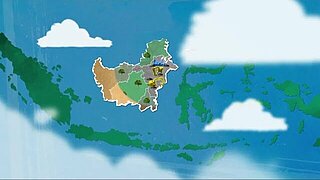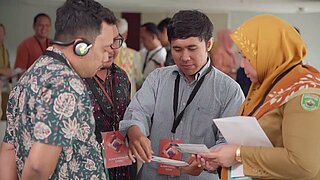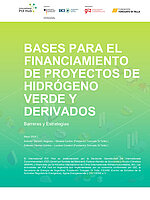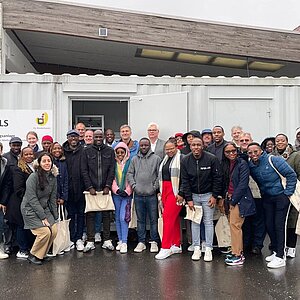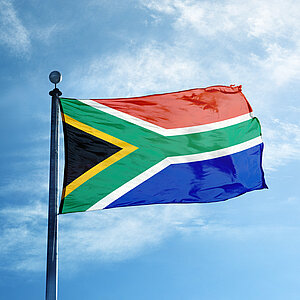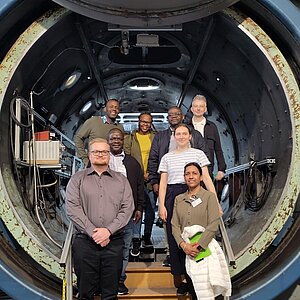IKI contributes to the just energy transition in South Africa
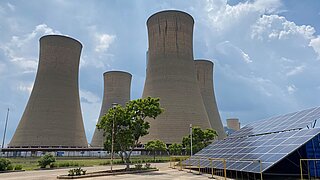
Several projects in the International Climate Initiative (IKI) are working with the Just Energy Transition Partnership (JETP) in South Africa to achieve the country’s targets on climate action.
South Africa has one of the most carbon-intensive economies in the world, since the country is dependent on fossil fuels in the electricity, industry and transport sectors. The industrial sectors of the country, including the mining, metal and automotive industries, have developed in close collaboration with the fossil energy sector, leading to complex mutual dependencies.
Despite various intervention measures, the supply of energy with predominantly old coal-fired power stations is not assured. Entire municipal districts have had to be regularly disconnected from the power grid for several hours to prevent a complete collapse of the grid. This measure is referred to as ‘load shedding’. The consequences for the population and for the economy as a whole is tremendous. In 2023, plans were laid to open up the electricity markets to the private sector and expand rooftop solar capacity. This has produced some initial benefits, as there has been no further load shedding since March 2024. The energy supply is still neither fully secured nor stable, however. As a result, there have been calls to postpone the planned decommissioning of various coal-fired power stations by up to 6 years – to 2030.
Therefore, the country still has to face the major challenge of making the expansion of additional power generation capacities renewable and sustainable. It also needs to develop a political strategy that takes economic growth as well as South African climate and biodiversity targets into consideration.
South Africa: IKI priority country and an important example for the global energy transition
As a priority country, South Africa is one of the countries where the International Climate Initiative (IKI) is focusing its work. This also applies to the global energy transition, which is defined in the IKI strategy as one of its priority action areas.
The IKI is one way in which Germany is supporting South Africa, building on Germany’s own experience in developing technologies for the energy transition, its finance, and its design as a socially just transition. One example of the latter is the creation of new jobs in former coal mining areas affected by economic change. Related to this is the IKI’s support for industrial decarbonisation as a key component in the mitigation of greenhouse gases.

A key instrument here is provided by the Just Energy Transition Partnerships (JETPs). JETPs are plurilateral partnerships that support selected countries in the Global South as they work to achieve an accelerated and socially just energy transition as well as ambitious mitigation measures. On this journey, the countries are supported by the German contribution, with some of this funding being provided by the IKI.
The JETPs combine financial and technical help provided by an international partner group (IPG). Aims here include enabling the expansion of renewable energy and power grids, energy efficiency measures and a just transition to low-emission energy systems.
Coal exit and renewable energy expansion
The JETP signed with South Africa aims to accelerate its coal exit while expanding renewable energy – as part of a just energy transition. Overall, the country aims to cut greenhouse gas emissions by 1 to 1.5 billion tonnes over the next 20 years. By way of comparison, Germany emitted around 762 million tonnes in 2021. These measures are focusing on decarbonising the electricity sector, vehicles with alternative drive systems and green hydrogen.
South Africa will need to make large investments to achieve these aims. For the period 2023 to 2027 alone, the country will need to find an estimated USD 100 billion. Within the JETP format, the IPG is providing USD 9.3 billion and therefore roughly 9.3 percent of this first tranche of funding as initial finance.

South Africa is an essential global partner in foreign policy and climate policy and is a pioneer for the energy transition on the African continent. The new Government of National Unity has a historical opportunity to push forward with a socially just energy transition, and therefore set an example of resilient and sustainable development on the African continent as a whole. In Germany, we wish to continue to offer our support to the best of our ability – such as with the South African Just Energy Transition Partnership.
In November 2022, an investment plan was published at the 27th UN Climate Change Conference (COP27) in Egypt. This plan was followed by an implementation plan at the 28th UN Climate Change Conference (COP28) in United Arab Emirates at the end of 2023. As a result, the JETP Secretariat was superseded by the Project Management Unit (PMU). The focus has now turned to converting the strategic goals of the JETP into concrete measures and to plan the financing of these measures.
IKI supports JETP in South Africa with three projects
Thanks to its own experience with the energy transition, Germany has advised South Africa as a JETP partner in relation to key reforms benefiting climate change mitigation and the energy market. Some initial and measurable successes have now been achieved. As one example, the number of solar installations has more than doubled to 6 GW of rooftop systems in the last two years. At the same time, the energy transition is creating new jobs: demand for well-qualified specialists for the expansion of renewables – installers, technicians and electricians – is rising significantly. In this way, the energy transition can also help to reduce social inequality – a challenge that is being faced by many industrial areas in South Africa.
JUST-SA project offers further training and support for working group against pollution in Mpumalanga

A key element of the IKI-funding provided is the project ‘Just Transition to a Decarbonised Economy for South Africa (JUST SA)’. This project is supporting JETP South Africa with targeted measures at national, regional and local level. These include further training on the topic of the green economy and the just transition, national and regional research programmes, ad hoc support for national and regional just transition processes as well as research on various aspects of financing a just transition. Such aspects range from developing the project pipeline to financial mechanisms and instruments.
In May 2024, the IKI’s Just SA project worked with the Trade Industrial Policy Strategies (TIPS) non-profit economic research institution in the province of Mpumulanga to organise further training for administration employees at provincial and local level. This training course offered participants a good opportunity to improve their knowledge of instruments and practical examples from the fields of sustainable management and the just transition. Among other aspects addressed, the three dimensions of a just transition were introduced: procedural justice, distributive justice and restorative justice – plus an analysis of the jobs that are under threat. As part of the JUST SA and TIPS partnership, this free training course was offered in all nine provinces of South Africa for employees at provincial and municipal level whose day-to-day work requires a solid understanding of climate change, sustainable management and just transition topics.
In 2024, the JUST SA project also partnered with WWF South Africa to organise a foundational meeting for a Technical Advisory Group (TAG) on water and soil pollution. The TAG now meets every three months. Fighting pollution and subsequent decontamination work in the mining region of Mpumalanga is hugely important, and the formation of the TAG is a key step in the right direction.
Beyond the TAG, JUST SA has set itself the goal of developing practical solutions and sustainable business models for soil and mine waste decontamination in Mpumalanga. This more comprehensive vision goes beyond the mere clear-up of this kind of contamination and aims to secure a sustainable future for the entire region. With workshops, publications and other resources, JUST SA is working with the WWF to help interest groups understand and implement established practices for decontamination.
IKI-JET promotes knowledge transfer through International Forum for Coal Regions

In the project ‘Innovation regions for a Just Energy Transition’ (IKI-JET), the focus is on dialogue with the key actors needed to ensure the success of a just energy transition. The project uses various formats to organise regular meetings with various groups of people, with the aim of promoting knowledge transfer and mutual learning.
The largest dialogue format is the International Forum for Coal Regions in Transition. In 2023, this was organised for the first time in Berlin on the premises of the IKI project management agency Zukunft – Umwelt – Gesellschaft (ZUG) gGmbH. In October 2024, the Forum was held in Pretoria, South Africa, attended by more than 100 representatives of trade unions, civil society, coal companies and policymakers in national and regional governments from the world’s coal mining regions. Many other delegates attended the event online.
The participants took an in-depth look at the South African concept of the fair transition, with various local speakers acting as their guides on the subject, highlighting the importance of economic diversification and community engagement in coal-dependent regions such as Mpumalanga. For their part, delegates from Chile, Colombia, Indonesia, Mongolia, Philippines, Thailand and Vietnam shared their insights and the challenges experienced with reference to their own coal regions.
As part of the Forum, the project is also organising trips to the coal regions in host countries.
IKI-JET is also developing an assessment instrument for just energy transition planning. The tool helps political decision-makers and stakeholders to develop or revise planning on the basis of comprehensive sustainability criteria. In addition, IKI-JET also developed an online training programme entitled ‘Just energy transition in coal mining regions’, which was attended by 26 people in July 2024.
PtX Pathways investigates decarbonisation options and pathways
As part of the international PtX Hub, PtX Pathways supports the development of sustainable Power-to-X (PtX) and hydrogen markets as a building block for the energy transition in Argentina, Morocco and South Africa. In South Africa, the IKI project is developing scenarios for the distribution and use of PtX technologies. These scenarios are based on an analysis of local and global supply and demand as well as the modelling of various economic segments. In light of the significant dependency of the country on coal, the decarbonisation pathways developed to date are being assessed on their ability to contribute to a just transition and to the retention of mining jobs. At the same time, unused potential is being investigated, such as the supply of climate-neutral fuels to the global shipping industry.
The project is also analysing decarbonisation options for processes such as coal liquefaction, and the production of hydrogen and PtX fuels, so as to promote strategic collaboration with the private sector. The results and insights will be communicated in the form of studies and dialogue formats such as training, workshops and conferences.
Outlook
Within the scope of the JETP, the IKI is planning to continue its close collaboration with its South African partners, so as to identify and develop further options for supporting the socially just energy transition.
The link has been copied to the clipboard
Contact
IKI Office
Zukunft – Umwelt – Gesellschaft (ZUG) gGmbH
Stresemannstraße 69-71
10963 Berlin



